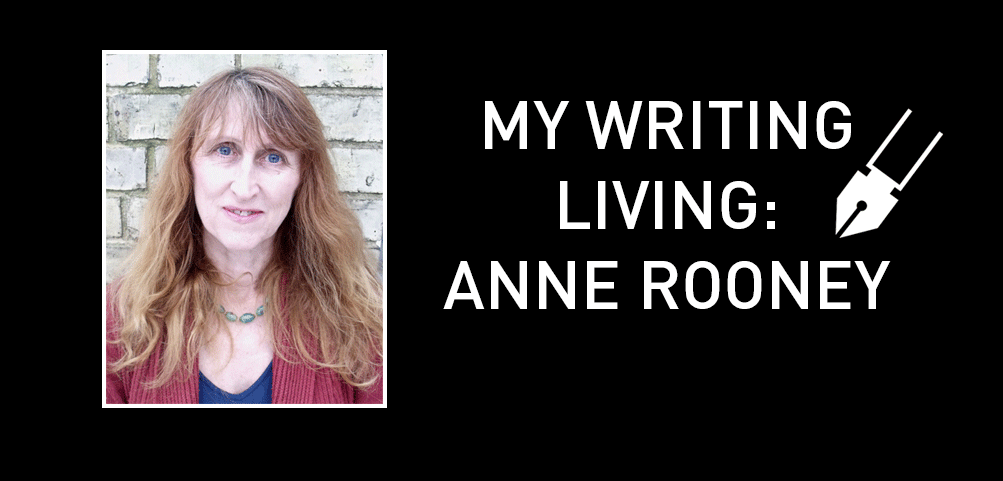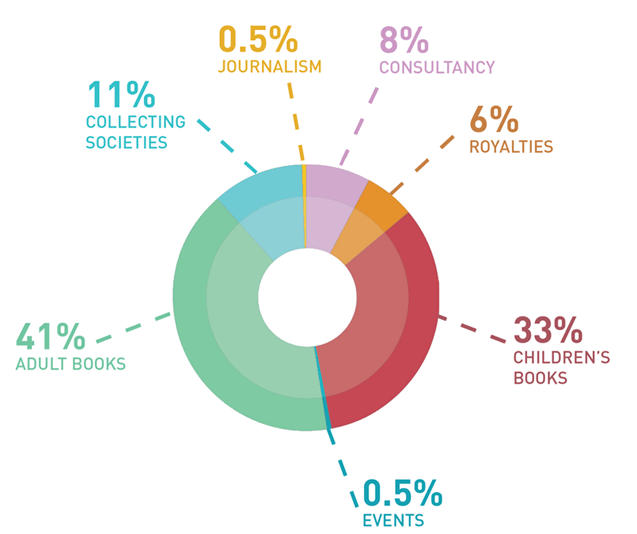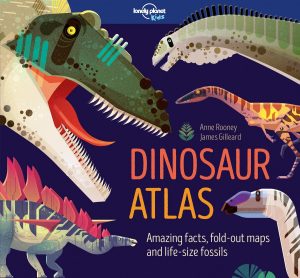MY WRITING LIVING: ANNE ROONEY

Anne Rooney explains what it takes to maintain a decent income level, in the face of falling fees and advances, and ever tighter publication schedules.
Anne Rooney is a prolific writer of books for all ages, from a host of lavishly illustrated non-fiction books for children, to numerous books about the history of science for adult general readers. “Short books for short people and longer books for longer people” as she puts it. Her children’s book Lonely Planet’s Dinosaur Atlas is currently shortlisted for the Royal Society’s Young People’s Book Prize.
At an average of £43,000 a year, Rooney’s income could be described as relatively healthy in the light of recent ALCS research, 2018 Authors’ Earnings: A survey of UK writers which found that the median annual income of a professional writer has now fallen below £10,500. Achieved through Rooney’s constant drive to fulfil commissions, her versatility and her head for business, her outwardly decent income level masks downward trends of a different kind however.
“I’m definitely a full-time writer”, Rooney tells me on the phone, on a break from her desk at her daily workspace in Cambridge University Library. “I keep timesheets, and so I know that when averaged over the whole year, I work 37.5 hours every single week.”
Over the past twenty years, however, Rooney’s annual income has been subject to some big fluctuations. Some of the dips have been due to events in her personal life, but others to external forces; in the tax year ending 2009 for example, her income halved due to the financial crash of that year. “I’ve had some very bad years, and some very good years. Last year there was a really difficult four- to five-month period when hardly any commissions came in. I suspect it was a kind of Brexit panic on the part of publishers.”
Despite such fluctuations, it’s noticeable that over the past two decades there has been no underlying rise in Rooney’s annual income which, however gradual, might have helped her earnings keep pace with inflation. Her income last year was only around £200 more than it was in 1999-2000 for example. And even to keep it relatively stable requires her to work ever harder. “In terms of being offered enough work to make a living, that still happens. But I get less per book so I have to write more. Because I’ve built up a big backlist, I do receive more royalties, and higher payments from PLR and ALCS over time, so that has improved. But it’s still harder to get through enough work to make a decent living. I do feel pressure to keep on delivering, and I’m always working on more than one book at a time.”
Some of Rooney’s book commissions are for a flat fee, others are on a royalty-basis. Whilst her children’s books currently bring in annual royalties of around £2,500, more and more commissions are offered on the basis of a flat fee. She has also experienced the erosion of royalties by stealth however. “Royalties from specifically educational books such as study guides used to be healthy, but some major educational publishers are trying to shift all new books to flat-fee deals. I think they will quietly let the royalty-based books drop out of print.”
“I do feel pressure to keep on delivering, and I’m always working on more than one book at a time.”
How does she decide whether a book is worth taking on financially? Would she ever turn a commission down? “I will if the fee’s too low and I can’t negotiate it up, or if it’s something I’m not interested in. I will occasionally take a slightly lower fee if it’s something that I want to do for another reason, or I know it will get good PLR. Sometimes I will take on a book where the fee isn’t very good, but it’s in a subject I’m keen to break into. That way I can use the commission to help me move into new areas of the market. And sometimes I will do a book because I know the publisher is having difficulty getting someone to do it, and I want to stay on good terms with them for the future. It’s all a bit of a juggling act. But it’s a very bad idea to take a commission that you have a bad feeling about, which you’re not interested in, or which is so badly paid that you’re going to resent doing it.”
Anne’s income sources during 2017/18

Pressure also comes from publishers’ increasingly demanding production schedules. “Year after year the deadlines get tighter and tighter. Publishers are spending far more time in house, deciding whether they’re going to do a book, and then discussing things like how much they’re going to pay the illustrator and what page size they’re going to have. And so by the time they get to me, they’re saying: can you do this in four weeks? The thing that most frustrates me is that if there’s a book I particularly want to do but which hasn’t been commissioned, I can’t afford to take out the time to work on it, and get it to a point where it could be commissioned. I’ve never turned something down to work on a book of my own because I can’t be certain I’ll sell it. If I take a month out, I still have to pay to live for those four weeks because I don’t have any other sources of income.”
“It’s all a bit of a juggling act. But it’s a very bad idea to take a commission that you have a bad feeling about, which you’re not interested in, or which is so badly paid that you’re going to resent doing it.”
What does she make of the results of the latest ALCS research? “It rings absolutely true. Not just because I know that I get paid less and less for the same work, but also because among the other writers I know, several have given up because they’re just not earning enough. They don’t want to compromise on quality, but if you have less time in which to earn the same amount of money it’s very difficult. Where I’m fortunate is that, having done a PhD, I have really good research skills so I can research anything quickly and effectively. But if you don’t have that, trying to speed things up is very difficult.”
Rooney has an admirably sound business head when it comes to her writing career, something she regards as crucial. “If we want publishers to treat us as equal business partners, we have to act like business partners. If we don’t keep track of our incomes, and know how we expect to do something, then we can’t really expect to be treated as professionals. But I do always try to have a good relationship with my editors, however young and inexperienced they might be. Because in five years’ time, they’re going to be a commissioning editor somewhere else. And so you really don’t want to have fallen out with them.”
The All Party Writers Group (APWG) has launched a call for evidence; encouraging all types of writers to provide written evidence on the professional challenges specific to authors, as well as the position of writers in the creative industry. ALCS would like to encourage as many of our members as possible to provide written evidence to the inquiry. The deadline for written evidence is 5pm on Thursday 2 August 2018.
The authors’ earnings findings booklet can be found here.
Interview by Caroline Sanderson: author, freelance books journalist and editor of ALCS News. She also chairs events at book festivals and in bookshops throughout the year.
Photograph © Luki Sumner-Rooney

